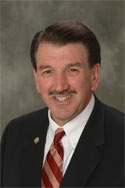By Larry Miller
HAPPY NEW YEAR! I hope that this article finds everyone happy and in good health to begin the New Year.
The year 2013 was a good year for farmers – great weather meant great crops. With the draught of 2012 almost anything would have been better but 2013 brought a fantastic crop to the Franklin County farmers.
Please be aware of new laws taking effect in Illinois after January 1st – here are just a few of the new laws.
No cell phones while driving unless they’re completely hands free.
Starting in 2014, drivers caught holding cell phones up to their ears could be subject to a $75 fine. Using a BlueTooth headset or speakerphone are both still acceptable as long as they can be activated by a voice command or single-button touch. Please remember that no texting and driving is already a law.
If you’ll be 18 by the General Election, you can vote in the primary.
The idea is that if you’re going to be able to vote in the General Election, you should be able to help select the candidates you will be voting for.
Tired of going 65 on Illinois interstates?
Lawmakers are too, so now you can go 70. Counties in Chicagoland and suburban St. Louis have the ability to opt out.
Littering Fines
Littering will net you a $50 fine. Cigarette butts now count as litter.
Lower penalties when worksite is empty.
Now there are higher penalties for speeding by workers and lower penalties when the worksite is empty.
School bus cameras
Buses will have cameras to record if anyone passes them. These tapes will be shared with the police.
Veterans Designation
Requires the Secretary of State’s office to ask whether a person applying for a driver’s license is a veteran; if the applicant is a veteran, a veteran’s designation may be added to the license.
The new Conceal & Carry Law went into effect on January 1 as well. If you have any questions you can go the Illinois State Police website and down the left side click on the link for firearms. There is a lot of information listed there. If you need a FOID card be sure and come out the Franklin County Farm Bureau office to apply. For a $5.00 fee we will take your picture and fill out your application and it will be ready to mail.
We also have pecans and chocolate covered pecans left in the office for sale – pecans – $9.00 for a pound bag and chocolate covered pecans – $8.00 for a 12 ozs bag.
Remember we are farmers working together. If we can help let us know.



